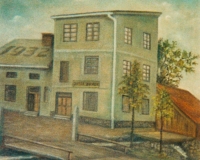The old people still harbour hate, but the youth are building friendships

Download image
Anna Fischer, née Brown, was born on 16 July 1927 in the village of Hyršov (Hirschau) close to Kdyně near Domažlice, which was fully German at the time. The family owned a large farm and the local fully operational modern mill, where a lot of Czechs from the surrounding villages came to grind their corn. Before the war, Anna went to the Poor School Sisters’ girls’ monastery school in Hyršov, which included compulsory Czech lessons in the afternoons. In 1938 the nuns were forced to close down the school and Anna started attending the local boys’ school. After school she completed her so-called “mandatory year” in Furth im Wald, after which she worked at a kindergarten in Všeruby. However, she was soon transferred to the ammunition works in Klenčí pod Čerchovem. At the end of the war she returned home to Hyršov. Afraid of working in Bohemia or Russia, on All Saints’ Day 1945 she decided to run away across the green border and settled in Stachesried. Anna visited her family regularly, undertaking great risk with each secret border crossing. Her family was only deported later. In 1990, Anna and her sisters returned to Hyršov for the first time since her family’s deportation. She found her father’s grave in the cemetery and took home a small lime-tree, which stands next to her private chapel to this day.




